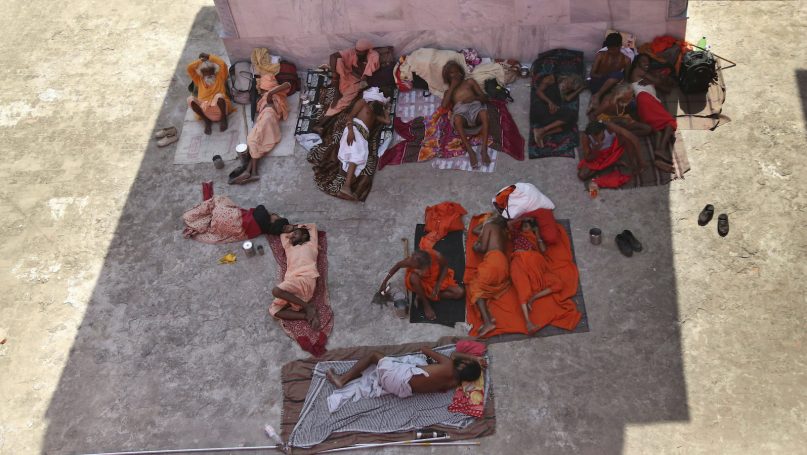SRINAGAR, India (AP) — Thousands of Hindu pilgrims began the arduous trek to an icy Himalayan cave in disputed Kashmir on Monday (July 1), with tens of thousands of Indian government forces guarding roads and mountain passes.
The pilgrims, many of them barefooted ascetics, chanted hymns and rang bells as they traveled through forested areas in Kashmir’s Himalayas. The worshippers approach the hallowed mountain cave, the Amarnath shrine, through two routes, a traditional one via the southern hill resort of Pahalgam and a shorter one through northeastern Baltal. Some also use helicopter services to pay quick obeisance.
The Amarnath cave is covered with snow most of the year except for a short period in summer when it is open for the pilgrims. Hindus worship a stalagmite inside the cave as an incarnation of Shiva, the Hindu god of destruction and regeneration. The cave lies 4,115 meters (13,500 feet) above sea level.
At least 40,000 Indian police and soldiers have been deployed to guard the pilgrimage. Carrying automatic rifles and wearing flak jackets, they have set up checkpoints, barricades and temporary camps along the routes leading to the cave.
“We’ve made adequate and comprehensive security arrangements,” said S.P. Pani, a top police officer. “We’re hoping it will be an incident-free pilgrimage.”
With a view of snowy peaks on their way, more than 200,000 pilgrims are expected to visit the cave during the 45-day pilgrimage. Old people and children rode ponies on Monday.
In 2017, gunmen sprayed bullets at a bus carrying Hindu pilgrims in the region, killing at least seven people, including six women, and wounding 19 others while they were returning from the cave shrine. The Indian government blamed Muslim rebels for the attack. However, separatist leaders accused Indian intelligence agencies of carrying out such attacks to sabotage their struggle for the right to self-determination.
In 2000, gunmen struck in the Pahalgam area and killed 30 people, including some local porters who carry the pilgrims’ baggage on the mountain path.
The pilgrimage concludes on Aug. 15, a full-moon night that Hindus say commemorates Shiva revealing the secret of the creation of the universe.
Muslim rebels fighting for decades against Indian rule in Kashmir accuse India’s Hindu majority of using the pilgrimage as a political statement to bolster its claim to the Himalayan region.
India and Pakistan claim Kashmir in its entirety and have fought two of their three wars over the competing claims over the Himalayan territory since the nuclear-armed rivals gained independence from British colonialism.
In Indian-controlled Kashmir, rebel groups have been fighting for either independence or a merger with Pakistan since 1989. Most Kashmiris support the rebel cause while also participating in civilian street protests against Indian control. Nearly 70,000 people have been killed in the uprising and the ensuing Indian military crackdown.





